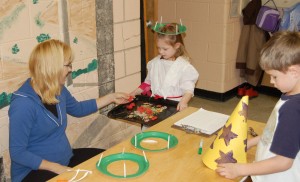
Once upon a time, I did not understand the benefits of preschool. I assumed it was just daycare for stressed-out SAHMs. Now, eight years and six preschools later, I’m a joyfully converted preschool mom with a deep appreciation for all I’ve learned from our experiences; the good, the bad and the downright ugly. Here are my top five preschool revelations that have helped me be a better parent.
1. Routines are necessary. I learned this the hard way with our first baby, but the concept was reinforced in preschool. Children behave well in a good school because the teachers follow a predictable routine. There is a natural order and rhythm to the child’s day. If you’ve ever wondered how a school can handle a room full of tots with one or two teachers; it’s all about the daily routine. They know how to keep the children engaged in specific activities for the appropriate length of time based on their age. There is no need for time outs or discipline in a good school. Instead, experienced teachers will turn a disagreement into a lesson on empathy and teach the children how to get along. Which brings me to my second revelation.
2. Children must learn how to play with other children. After age two, children take greater notice of the people surrounding them. If there are rarely any children, they will naturally gravitate to adults in all situations. I can always tell which children spend all their time with adults when we are in a group play environment. When I was a parent teacher in a cooperative kindergarten class, it was my primary job to placate the two children who had never been to preschool and did not have similar-aged siblings. Of the ten children in the class, these two needed constant guidance and hand-holding (the kind of care they were accustomed to). They did not get along well with the other children and became easily upset if they were not allowed to make the rules during playtime. I see the same patterns of behavior in the neighborhood and in church groups. Some children are shy, but children without exposure to other children are more comfortable with a grown-up, even one they barely know.
3. Your child is almost certainly not gifted. Let’s face it, we all think our child is developmentally advanced at some point in their lives. In some cases this is true, but it does not make your child a prodigy. All of these skills tend to balance out by the second or third grade. Spending time with a diverse group of children is the best way to understand childhood development. You can easily see why your five-year-old can’t sit still through dinner (NONE of them can). You can also see that while some kids master vocal skills at a younger age, others will master fine motor skills or gross motor skills. It all evens out as all these skills come on line over time.
4. You can’t teach them everything by yourself. There’s a lot you can teach at home, and with good reason. But teaching children how to learn in a group dynamic is not one of them. Teaching your preschool child how to read will not make them smarter or better equipped to handle school. Knowing letters and numbers does not mean that preschool should be skipped. No amount of flash cards, sidewalk chalk writing or frog-encrusted learning games can replace the interpersonal relationships that take place in a group setting. I do not mean to disparage homeschoolers who already know this. In my city, it’s easy to organize weekly field trips or sporting events with groups of other homeschoolers. It appears that smart homeschooling moms have figured out the importance of the group dynamic.
5. Elementary school ain’t what it used to be. I started kindergarten when I was 4 years old and had never been to preschool. This was common in my small town. We were not really expected to know anything walking in the door. Now, thirty-odd years later, children are expected to come to kindergarten with a solid base of knowledge and social skills. And while preschool teaches children all the basics of numbers, letters, shapes, colors and early phonetics; it also allows them to learn these things in a fun, play-based environment. Our public schools no longer have this luxury. The elementary schools have so many standards to perform to that the kids must spend a majority of their time sitting, doing worksheets, taking tests and reading silently. Students are now expected to learn to read independently before first grade. I’ve found that two years of preschool has helped ease my children into the more grueling demands of elementary school. They develop a love of learning in preschool that is sometimes hard to keep going in elementary classrooms. Some elementary teachers have a natural ability to make learning fun, but others sadly do not. That’s when it’s up to me to draw upon all the tricks I learned during their preschool years to help them along and see the fun side of school again.
As we’re preparing for school to start again in August, I’m happy once again about our decision to send the two older girls to preschool. I have no anxieties about my middle girl starting kindergarten because she has proven to me over the past two years that she is ready socially, academically and emotionally to begin school. When the time comes for my youngest daughter to graduate from preschool, I will be sad to say goodbye to these joyful days of handmade presents made in secret, love letters written to special teachers and children who spring out of bed each morning ready and excited for another day of learning disguised as playtime.
Add to: Facebook | Digg | Del.icio.us | Stumbleupon | Reddit | Blinklist | Twitter | Technorati | Yahoo Buzz | Newsvine
One thought on “What Parents Learn in Preschool”